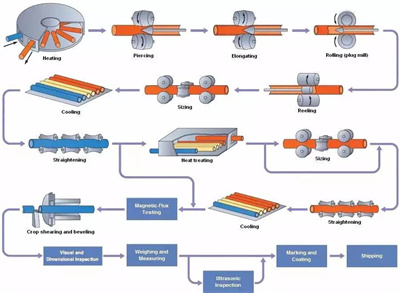How much do you know about seamless steel pipes?
I wonder how much you gold fans know about seamless steel pipes? Seamless steel pipe is a round, square, or rectangular steel material with a hollow cross-section and no seams around it. Seamless steel pipes are made from steel ingots or solid tube blanks that are perforated into capillary tubes, and then hot-rolled, cold-rolled, or cold-drawn. Seamless steel pipes have hollow cross-sections and are widely used as pipes for transporting fluids. Compared with solid steel materials such as round steel, steel pipes are lighter in weight when the bending and torsional strength are the same. They are an economical cross-section steel and are widely used in manufacturing structures. parts and mechanical parts, such as steel scaffolding for oil drills, etc.
Development history of seamless steel pipe
Seamless steel pipe production has a history of nearly 100 years.
The German Mannesmann brothers first invented the two-roller cross-rolling piercing machine in 1885, and the cycle pipe rolling machine in 1891. In 1903, the Swiss R.C. Stiefel invented the automatic pipe rolling machine (also called the top rolling machine). pipe machine), and later various stretching machines such as continuous pipe rolling machines and pipe jacking machines appeared, and the modern seamless steel pipe industry began to form.
In the 1930s, the variety and quality of steel pipes were improved due to the adoption of three-roll pipe rolling machines, extruders, and periodic cold-rolled pipe machines. In the 1960s, due to the improvement of continuous pipe rolling machines and the emergence of three-roll piercing machines, especially the success of applying tension reducers and continuous casting billets, production efficiency was improved and the ability of seamless pipes to compete with welded pipes was enhanced. In the 1970s, seamless pipes and welded pipes were keeping pace with each other, and world steel pipe production was increasing at a rate of more than 5% per year.
After 1953, China attached great importance to the development of the seamless steel pipe industry and initially formed a production system for rolling various large, medium, and small pipes. Copper pipes also generally use ingot cross-rolling and perforation, pipe rolling machine rolling, and coil drawing processes.
The uses and classification of seamless steel pipes
Purpose: Seamless steel pipe is an economical cross-section steel that plays an important role in the national economy and is widely used in petroleum, chemical industry, boilers, power stations, ships, machinery manufacturing, automobiles, aviation, aerospace, energy, geology, construction and various sectors such as military industry.
Classification:
① According to the cross-section shape: circular cross-section pipe, special-shaped cross-section pipe
②According to material: carbon steel pipe, alloy steel pipe, stainless steel pipe, composite pipe
③ According to the connection method: threaded connection pipe, welded pipe
④According to production method: hot-rolled (extruded, topped, expanded) pipes, cold-rolled (drawn) pipes
⑤According to use: boiler pipes, oil well pipes, pipeline pipes, structural pipes, fertilizer pipes…
Seamless steel pipe production process
① The main production processes of hot-rolled seamless steel pipes (main inspection processes):
Preparation and inspection of tube blanks → Heating of tube blanks → Perforation → pipe rolling → Reheating of waste pipes → determining (reducing) diameter → Heat treatment → Straightening of finished pipes → Finishing → Inspection (non-destructive, physical and chemical, Taiwan inspection) → warehousing
②The main production processes of cold-rolled (drawn) seamless steel pipes
Blank preparation→pickling and lubrication→cold rolling (drawing)→heat treatment→straightening→finishing→inspection
The production process flow chart of hot-rolled seamless steel pipe is as follows:



